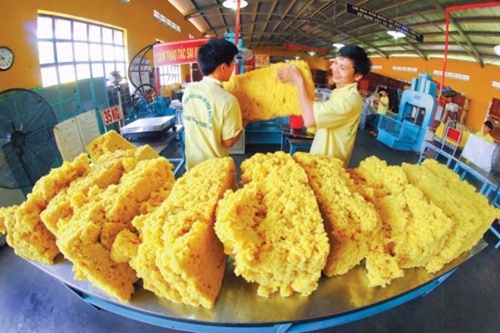Rubber firms urged to reform
 |
| Viet Nam's natural rubber exports this year are estimated to reach 1.1 million tonnes worth US$1.6 billion, a reduction of 3 per cent in volume and 10 per cent in value, he said.-Photo cafef.vn |
Speaking at the Global Rubber conference in HCM City on Friday, Abdul Aziz Kadir, secretary general of the International Rubber Research Development Board (IRRDB), said with a high inventory coupled with public debt in the EU and Chinese economy showing signs of slowing down as well as falling oil prices, the global rubber industry is expected to continue to face a difficult time.
Tran Ngoc Thuan, chairman of the Viet Nam Rubber Association and president of the Viet Nam Rubber Group, said new rubber cultivation areas in Viet Nam had shrunk significantly and rubber smallholders had suspended latex extraction from their trees since the selling price was lower than production prices.
In some areas that have low productivity, farmers have replaced rubber trees with other trees, he said.
Viet Nam's natural rubber exports this year are estimated to reach 1.1 million tonnes worth US$1.6 billion, a reduction of 3 per cent in volume and 10 per cent in value, he said.
Vietnamese rubber is available in more than 86 countries and territories, with China, Malaysia, India and South Korea being largest buyers, he said.
Ha Cong Tuan, Deputy Minister of Agriculture and Rural Development, said in the current difficulties the domestic rubber industry should implement the Government's policy on building a long-term development strategy for and restructuring the industry towards raising added value and developing it a sustainable manner.
Last year, 85 per cent of the total rubber export volume was raw natural rubber and fetched nearly $1.8 billion.
But the country had to spend a larger value to import rubber-based products and synthetic rubber, he said.
The country earned more than $1.5 million last year using about 15 per cent natural rubber to produce finished rubber products like tyres, gloves, technical rubber, rubber parts and conveyor belts for exports, he said.
To reduce the export of raw materials, the rubber processing industry needs to be promoted, he said.
To cope with the situation of supply that is higher than demand, producers should reduce the frequency of latex extraction to cut expenses and raise productivity. They also should intercrop with other trees or take other measures to increase earnings of rubber cultivation areas.
Besides making efforts to boost exports to existing markets, companies should look for new markets and improve product quality, he said.
Tran Tuan Anh, Deputy Minister of Industry and Trade, said enterprises and the Viet Nam Rubber Association should focus on reforming their technologies to improve product quality. This is critical for increasing competitiveness of Vietnamese rubber on the world market.
Firms also need to pay more attention to building brands for their products and trade promotions to expand the export of Vietnamese rubber, he said.
At the three-day Global Rubber Conference which ended on Saturday, delegates also discussed a wide spectrum of commercial and research and developments, shared experiences, and received updates on the latest trends and technology transformations.
What the stars mean:
★ Poor ★ ★ Promising ★★★ Good ★★★★ Very good ★★★★★ Exceptional
Latest News
More News
- State corporations poised to drive 2026 growth (February 03, 2026 | 13:58)
- Why high-tech talent will define Vietnam’s growth (February 02, 2026 | 10:47)
- FMCG resilience amid varying storms (February 02, 2026 | 10:00)
- Customs reforms strengthen business confidence, support trade growth (February 01, 2026 | 08:20)
- Vietnam and US to launch sixth trade negotiation round (January 30, 2026 | 15:19)
- Digital publishing emerges as key growth driver in Vietnam (January 30, 2026 | 10:59)
- EVN signs key contract for Tri An hydropower expansion (January 30, 2026 | 10:57)
- Vietnam to lead trade growth in ASEAN (January 29, 2026 | 15:08)
- Carlsberg Vietnam delivers Lunar New Year support in central region (January 28, 2026 | 17:19)
- TikTok penalised $35,000 in Vietnam for consumer protection violations (January 28, 2026 | 17:15)
















 Mobile Version
Mobile Version